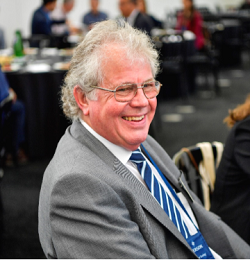Petroleum geoscientist devoted to the pursuit of excellence
 Paul Francis Worthington was born on 8 August 1945 in Preston, Lancashire. The son of a head teacher and an assistant head teacher, he attended St Mary’s College, Blackburn, and remained proud of his northern English roots throughout his life.
Paul Francis Worthington was born on 8 August 1945 in Preston, Lancashire. The son of a head teacher and an assistant head teacher, he attended St Mary’s College, Blackburn, and remained proud of his northern English roots throughout his life.
After taking a Bachelor of Science degree in Maths and Physics from the University of Hull, UK, he taught for a year at Kilburn Polytechnic in London. A late night conversation at a party introduced him to geophysics, and that chance encounter set him on the path that defined his academic and professional life.
Academia and industry
Thereafter Paul’s academic career took him first to an MSc. in Geophysics at Durham, then to the University of Birmingham, UK, where he both earned a PhD researching the petrophysics of the Sherwood Sandstone Group and met Catherine, his wife of almost 50 years.
He started his technical career in the water industry with five years in Pretoria, South Africa, during which he became Chief Research Officer with the South African Council for Scientific and Industrial Research and was awarded a D.Sc. by the University of Pretoria. After his return to the UK he spent two more years in the water industry with Howard Humphreys & Partners in Reading, before moving into the oil industry with BP in 1980.
Within BP, he rose to become Head of Formation Evaluation at the BP Research Centre in Sunbury-on-Thames, England, promoting study of both the theoretical side of petrophysics and the use of core data as an aid to integrated reservoir characterisation - especially in reservoir formations that contained appreciable amounts of clay. After BP he joined the petroleum engineering consulting firm GaffneyCline, based in Hampshire, UK and Singapore, where he concentrated on matters of equity redetermination and reserves estimation.
The pursuit of excellence
Paul was devoted to the pursuit of excellence and to sharing his knowledge for the benefit of the industry. He published more than 100 peer-reviewed papers in the fields of engineering geoscience and petroleum unitization and coedited four books on core and log analysis. More than a few of Paul’s papers are considered seminal within their subject areas and must be referenced in any relevant research. He served the Society of Petrophysicists and Well Log Analysts (SPWLA) in many roles, including as its President (1985–1986). In addition, he co-chaired four topical conferences and the first Annual Symposium of the Society to be held outside of the USA, in London in 1987. Despite a downturn in the oil and gas industry, Paul’s vision and drive ensured that the event was a technical, social and financial success.
Paul was the recipient of numerous SPWLA Awards for technical achievement and service, including the society’s top honour, the Gold Medal for Technical Achievement (2012).
Outside of SPWLA, from 1986–1992 he served as Chairman of the Downhole Measurements Panel of the International Ocean Drilling Program and was for 10 years a co-editor of Petroleum Geoscience for the Geological Society of London. He was also active in the London Section of the Society of Petroleum Engineers, being a guest speaker from time to time at their monthly meetings.
Legendary determination
Paul’s determination was legendary. As a young man, he was a football (soccer) goalkeeper of formidable reputation and became a lifelong fan of Manchester United. Wherever in the world he travelled, he would go to great lengths to do two things - watch the latest match of the ‘Red Devils’ and attend Mass. As both a scientist and a committed Christian, the Catholic faith played a huge role in Paul’s life. He was an active parishioner in the parish of St Francis, Ascot, for almost 40 years, where he taught the children’s liturgy, was a regular reader and edited the parish magazine. In later life he was honoured to be invited to become a Knight of the Equestrian Order of the Holy Sepulchre of Jerusalem.
Paul continued his pursuit of learning and education right until the end. His final academic achievement was consolidating the legal side of his unitization experience into an LLM by Research at the University of Reading, UK. This work is now published as his final legacy, ‘The Law on Petroleum Unitization’.
Paul is survived by his loving wife Catherine, his children Michelle, Mark and Tim and his four grandchildren.
By Mark Worthington and Brian Moss